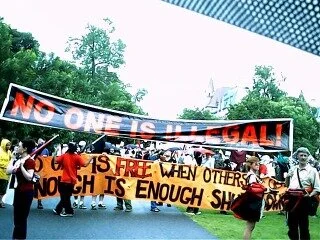Sweeping Europe’s Bad Conscience Under The Carpet
In the wake of the Immigration, Residence and Protection Bill, which was published by the Twenty-Six County government in January this year, it has become clear that the Fianna Fáil-led administration intends to pursue its criminalisation of refugees through incarceration.
It has been revealed that a section of the 1,400 capacity Thornton Hall Prison in Dublin currently under construction is to be reserved for “detaining foreign nationals unlawfully in the State”. How great this section will be is unclear, although the average number of immigrants and refugees incarcerated is in the region of 1,200 per year.
The imprisonment of foreign nationals is permitted by the Bill in circumstances whereby an entry permit is unavailable for “practical” (i.e. bureaucratic) reasons. Thus, a refugee arriving in the Twenty-Six Counties can reasonably expect to spend at least some time in prison being treated as a criminal.
Such conditions have occasioned criticism from several groups involved in the advocacy of human rights, including the Irish Refugee Council, the Irish Penal Reform Trust, Jesuit Refugee Service Ireland and the Human Rights Commission.
Éirígí chairperson Brian Leeson said the Dublin government was acting in flagrant breach of its humanitarian obligations.
“It seems clear that the Twenty-Six County government, which currently follows the practice of incarcerating refugees and other so called ‘unlawful’ immigrants alongside Irish convicts, is attempting to improve its image whilst doing little for those people coming to Ireland seeking protection from the ravages of political, economic or social violence inflicted upon them in their native country,” he said.
“The separation of refugees from other prisoners has been a long-standing demand of those concerned with the enforcement of basic human rights. However, according to the United Nations High Commissioner for Refugees, the continued insistence upon needlessly incarcerating such people runs contrary to international law, which demands that imprisonment of refugees takes place only under “exceptional” circumstances.
Brian concluded: “And so, to imprison refugees as a matter of course pending the resolution of bureaucratic obstacles to their entry into the country is clearly illegal.”
Such moves by the Twenty-Six County government come in the wake of increasingly xenophobic legislation being passed throughout Europe, specifically aimed at preventing refugees from outside Europe crossing their borders.
Switzerland, Austria, Denmark, Hungary, Slovakia and some German states have all seen the far-right with strong ‘anti-foreign’ rhetoric coming to power, as the EU moves ever-closer to what has been termed “Fortress Europe”.
Such trends are taking place within a larger context, in which the threat of a global recession seems all but upon us.
This is leading to a greater tendency to close borders and erect protectionist tariffs. Furthermore, as economic problems start to bite, the need to find scapegoats for the current ‘blimp’ in the era of supposedly eternal economic growth and flourishing multiculturalism becomes ever-more pressing. A role (as many Irish will testify) easily filled by the newly-arrived immigrant.
This raises the question as to who these refugees and immigrants to Europe actually are. The spectre of immigration is haunting parts of Europe in a most profound and obvious way because it is the sons and daughters of those thought to be most thoroughly colonised, who are now rising up in violence against their respective states and refusing to accept maltreatment and discrimination any longer.
Similarly and on a bigger scale, the ravages of global capitalism that have enriched the imperialist states have created its own victims who have not necessarily been shot or tortured by the colonisers, but have simply seen their water supply privatised, their local market dumped with cheap grain or been made unemployed by global market prices.
These people are those who come to Europe fleeing US and European-backed authoritarian regimes seeking shelter, a job, the wealth that has been denied them and their people. In short, these people represent the bad conscience of imperialist governments; the failure of the global capitalist project from which they are benefitting; and so the ‘western governments’ (including Leinster House) don’t even want to see them.


